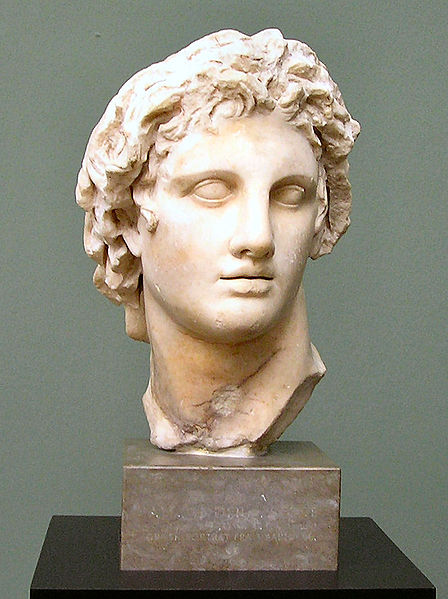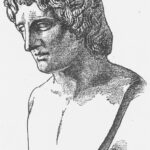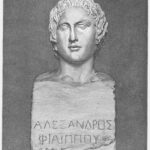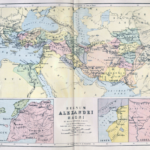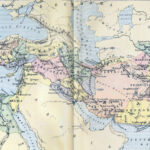Alexander the Great
Explorer
Ancient
Quick Facts:
Alexander the Great is known as the creator of one of the largest empires in the history of the world.
Introduction
Alexander the Great (also known as Alexander III of Macedon) conquered most of the ancient world in less than ten years. While he is usually referred to as “Alexander the Great,” some people think he should be called “Terrible” instead because of all the wars he fought. History remembers him for his reputation as a fearless conqueror and ruler. But despite this, there’s no denying that his conquests changed and helped shape the ancient world.
Biography
Early Life
Alexander the Great was born in Pella, Macedonia, part of Northern Greece. Although the exact date of Alexander’s birth is unknown, most historians believe that he was born in 356 BCE in late July.1 His parents were King Philip II of Macedonia and Queen Olympias of Epirus. When he was ten years old, he tamed a dangerous stallion that he named Bucephalus. He would ride this horse into all his battles. As a teenager, Alexander received an excellent education from his tutor the Greek philosopher Aristotle. And because he was one day expected to join his father on the battlefield, he trained to prepare for life as a soldier. At 18, he fought with his father against the armies of Athens and Thebes. Their victory made King Philip ruler of Greece. When Philip was assassinated in 336 BCE, Alexander became king of Macedonia at age 20
In 334 BCE, Alexander invaded the Persian Empire (modern day Iran) with an army of Macedonians, Greeks, and other allies. He took control of the western half of Asia Minor (modern day Turkey). Alexander later took complete control of the area after conquering Mesopotamia (modern day Iraq) and defeating the Persian emperor Darius III. Afterwards, Alexander began expanding his empire north and east. In 326 BCE he made it as far as Pakistan and India where he began perhaps his most well-known exploration.
Voyages
Principal Voyage
Alexander the Great was not just a conqueror, he was also an explorer. Part of the purpose of his Indian voyage was to discover if the Indian Ocean an inland sea like the Mediterranean Sea or if it was an open sea that encircled a larger area of the world.2 There were two exploration parties: one by land and one by sea. The sea fleet was commanded by Nearchus, one of Alexander’s naval officers. They sailed in triaconter ships. This was an open boat composed of 15 oars and was lighter and faster than most. However, it could not carry much food and water. Alexander’s plan of marching along the coast at the same time was so that he could gather supplies and food for the fleet.3
They explored the main parts of the Indus River. Bad weather forced them to turn around. On the second attempt, they reached the Indian Ocean. Alexander and his crew sailed out into the ocean, landing on a few small islands, and returned to sail down the other half of the Indus. He completely sailed the length of this river. Eventually, Nearchus continued on water further exploring the Persian Gulf, where Pakistan and Iran lie today. Alexander took a route on land through the Gedrosian Desert. He and his men trekked for about 60 days. Alexander eventually met back up with Nearchus around the Straits of Hormuz.4 His entire journey down the rivers to the sea and over land took about seven months.5
Subsequent Voyages
Alexander’s empire stretched more than 3,000 miles. It included his native Macedonia and Greece, Egypt, Mesopotamia, and the large Persian Empire. His expeditions and conquests took him over land, over mountains, along coastlines, and out to different seas. It was not uncommon for Alexander to want to learn about the areas that he would conquer or pass through. His desire to learn was probably influenced by Aristotle’s teachings. It is said that he took scientists with him to record and study the plants, animals, people, and geography of many of the places he passed through or conquered.6 While exploring India, these scientists provided great detail of many of the plants and animals from monkeys, wild cats, parrots, peacocks, and snakes.7
Later Years and Death
Alexander the Great died in 323 BCE just shy of his 33rd birthday. Before his death, Alexander wanted to explore more of the coast of his own land to expand maritime trade. He had two explorations in mind – the Caspian Sea and the coast of Arabia.8 Modern historians are not sure of the cause of his death. It seems, however, that he caught a disease–either typhoid fever or malaria. His condition worsened and became complicated by dangerous living conditions and prior battle injuries. It has also been suggested that he might have been poisoned.9 After his death, a power struggle divided his empire into four kingdom, until Roman power grew and overtook these kingdoms.
Legacy
Alexander the Great is more known for being a conqueror than an explorer, but in a way he was both. His conquest of India brought long-lasting influences. It expanded trade between the East and West, and spread Greek culture throughout the Middle East. He helped spread the Greek culture, language, and ideas across many lands. His journey’s contributed to improving knowledge in geography and science. His ambition expanded Greek culture far outside of Greece. Today we recognize him as a skilled and highly respected military leader and conqueror. But his lesser known interest in exploration allows us to see another side to this great man.
Images
- Drawing of bust of Alexander the Great. The Mariners’ Museum DF214 .D96 Rare.
- Image of the bust of Alexander the Great, with Greek inscription that loosely translats to “Alexander Philippous.” The Mariners’ Museum DF214 .D96 Rare.
- Map highlighting the size of Alexander the Great’s Kingdon, from Macedonia, east to Asia and south into Africa. The Mariners’ Museum from G1033 .G4 1880 Rare.
- Enlarged from map highlighting the Kingdom of Alexander the Great The Mariners’ Museum from G1033 .G4 1880 Rare.
Endnotes
- Peter Green, Alexander of Macedon, 356-323 B.C. A Historical Biography, (Berkeley: University of California Press, 1991), xxxiii-xxxiv.
- Ian Worthington, Alexander the Great: Man and God, (New York: Routledge, 2004), cviii.
- Worthington, Alexander the Great, cviii.
- Carol G. Thomas, Alexander the Great in His World, (Malden: Blackwell Publishing, 2007), 19.
- John Watson McCrindle, The Invasion of India by Alexander the Great as Described by Arrian, Q. Curtius, Diodoros, Plutarch and Justin, (Westminster: A. Constable and Company, 1893), 316.
- “Alexander the Great,” Ancient History Encyclopedia, accessed July 24, 2017, http://www.ancient.eu/Alexander_the_Great/.
- Liliane Bodson, “Alexander the Great and the Scientific Exploration of the Oriental Part of His Empire: An Overview of the Background, Trends and Results,” Ancient Society, 22 (1991): 134, accessed July 27, 2017, http://www.jstor.org/stable/44079456.
- W.W. Tarn, Alexander the Great: Volume 2, Sources and Studies, vol. 2, (Cambridge: Cambridge University Press, 1948), 394.
- Robert B. Strassler and James Romm, eds., The Landmark Arrian: The Campaigns of Alexander, trans. Pamela Mensch, (New York: Anchor Books, 2012), 312.

